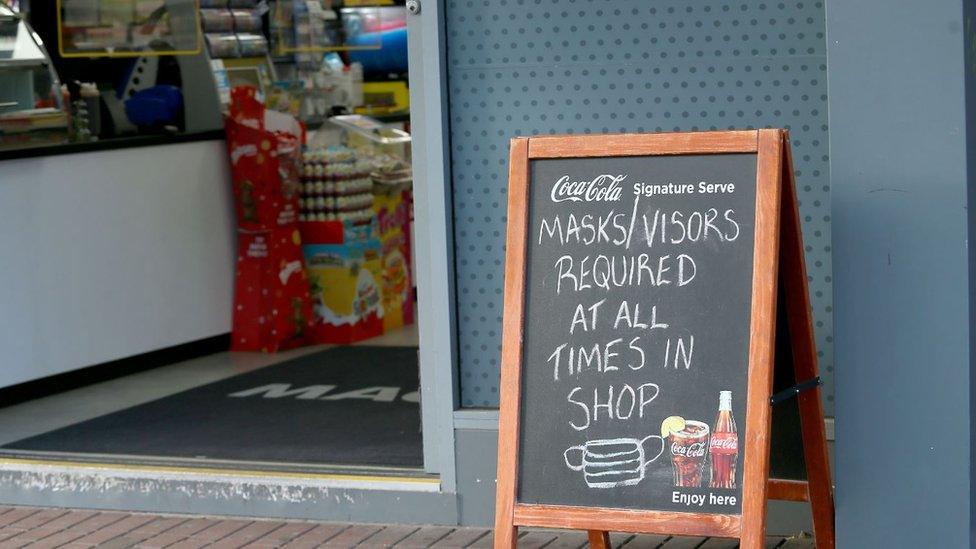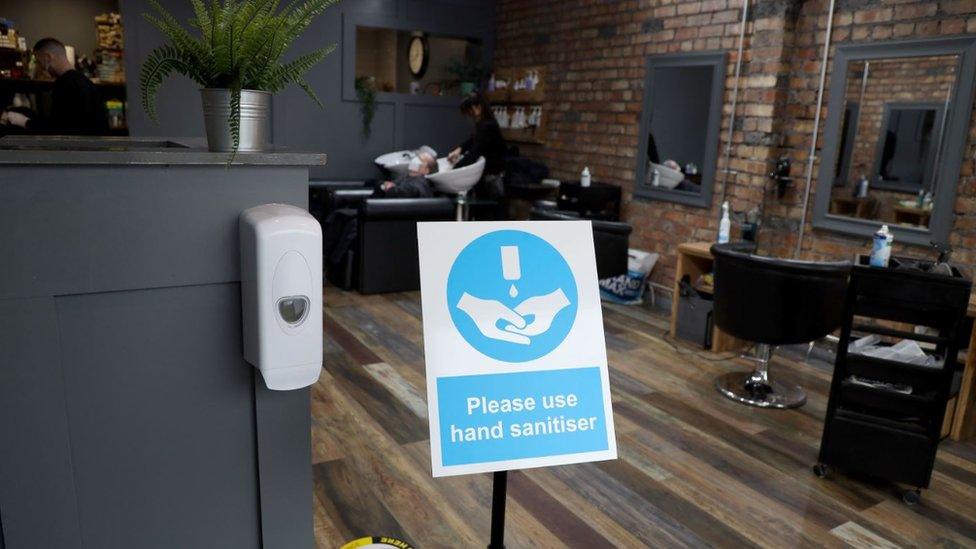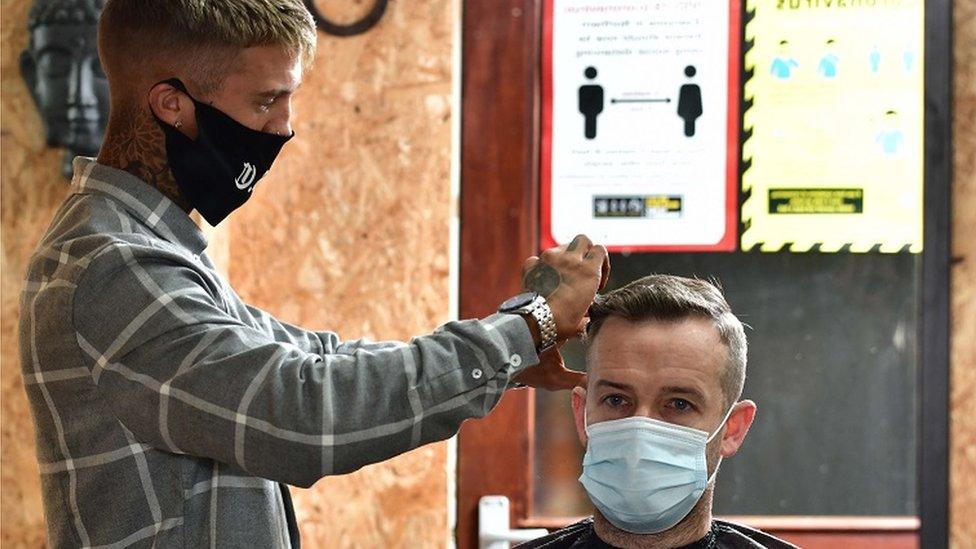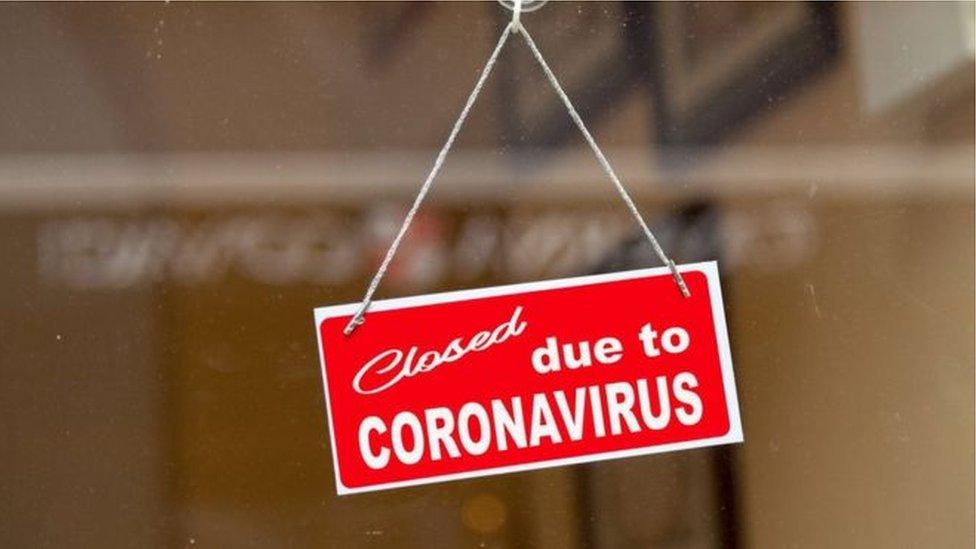Covid-19: Businesses 'left in the dark' over support scheme
- Published

The Localised Restriction Support Scheme is aimed at helping businesses with a physical location
Some businesses in Northern Ireland have been "left in the dark" waiting for pandemic support payments, a business representative body has said.
The Localised Restrictions Support Scheme (LRSS) began in October. , external
It is aimed at businesses forced to close or severely restrict operations because of government regulations to try to halt the spread of Covid-19.
The Department of Finance said it has paid £113m, to date, to more than 10,000 businesses under the scheme.
It began issuing top-up payments earlier this month to cover the six-week lockdown from 26 December.
However, FSB NI which provides small businesses with advice, said some premises had not received "any support, or have found accessing the schemes challenging".
Roger Pollen, FSB NI Head of External Affairs, said many of its members "have been grateful" for the support they received due to their businesses having to close as part of Covid-19 restrictions.
"However, we have been contacted by numerous businesses who have experienced issues," he said.
Figures released by the Department of Finance for the period up to 4 January, in response to a written question from SDLP MLA Justin McNulty, showed 1,632 applications remained unprocessed at that time.
The department pointed out that more than 85% of applications had been processed, and of the applications outstanding at that time, a large number had been received since 26 December.
It said it was "making every effort" to process the remaining applications "as quickly as possible".
Up to the start of the month, 6,295 applications had been rejected, out of a total of 18,045.
The Department of Finance told BBC News NI that almost 30% of rejections were due to duplicate applications being submitted by the same business, and more than a quarter were due to the business type not being eligible.

'It is totally stressful'
Donna Conroy from Forest Stables, an equestrian centre in Fermanagh, said she had applied to the fund on 22 October, but has yet to hear a decision on her application.
Ms Conroy said she had to sell some of her ponies to be able to continue financially.
She said the business had been due to celebrate its 20th anniversary at Easter, but she was now unsure if it would still be open by then.
"It is totally stressful. I am just in limbo because they have now reopened other grants.
"If I knew the outcome of my original application I could move on - I am just stuck," she said.
"I support the lockdown, I'm not against that, we have to take personal and social responsibility. I just believe that if a business is forced to close down, then we need support."

What is the Localised Restrictions Support Scheme?
The Localised Restrictions Support Scheme (LRSS) is aimed at businesses forced to close or have had business activities at their premises directly curtailed by health protection restrictions that have been put in place by the NI Executive.
The scheme came into effect in October of last year and is operated by the Department of Finance.
It was initially offered to applicants in the Derry City and Strabane District Council area on 14 October before being expanded to all council areas later that month.
Payments range from £800 - £1,600 for each week a business is closed, depending on its size.

Some businesses have faced a longer wait than anticipated for payment
Eligible businesses include cafes, pubs, hotels, close-contact services like hairdressers and other businesses required to close such as cinemas, museums and galleries.

'I called Stormont'
Walter Matthews from Back Care Mattresses in Ballynahinch, County Down, said his business had been closed for about five months last year, and he had struggled to communicate with the department about his application.
"It is like anybody else, it is your livelihood, if you don't have a good turnover you still pay your taxes at the end of the year," he said.
"If you are not bringing the turnover in and the money in, it is very hard to know where it is all going to come from."
Mr Matthews said he attempted to call Finance Minister Conor Murphy directly at Stormont after sending six emails about his application to LRSS.
"I want him to come out and clarify when are the grants going to be paid into people's accounts," he said.
"If it is going to take three weeks, is it going to be three weeks? Or is it going to take 10 weeks?"
Mr Matthews said staff at Stormont were unable to put him through.
On Friday, it emerged that tens of thousands of small businesses across the UK will receive insurance payouts covering losses from the first national lockdown, following a court ruling.
Related topics
- Published11 January 2021

- Published16 December 2020
